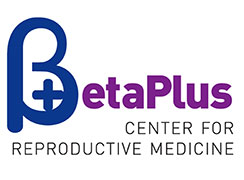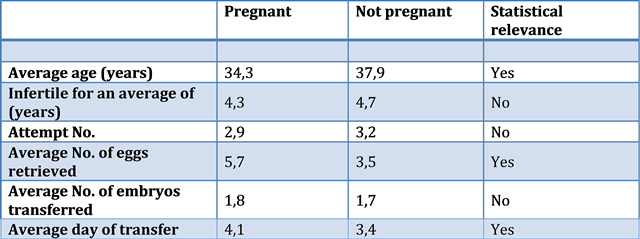These results are the overall ART success rates in BetaPlus Center in 2012.
ARTIFICIAL INSEMINATION HUSBAND (AIH)
Total success rate for the year was 14%. Patients were aged 24 to 38. Average age of patients becoming pregnant, usually after the first or second insemination, was 30.6. Average age of patients not becoming pregnant was 32.7. One pregnancy resulted in twins in this group of patients.
IVF/ICSI
In 2012, our success rate was 36% per started stimulation, and 39% per embryo transfer. At the moment, we are at 33.9% of achieved clinical pregnancies (after week 12 of pregnancy) per embryo transfer. The youngest patient becoming pregnant after an IVF treatment was 25 and the oldest was 43. In the table below, a statistical comparative analysis of these procedures is presented. They show greater success in younger women, in women who have had more eggs retrieved as well as in women who had their embryo transferred on day 5.
Patients who had 2 blastocyst transferred success rate was 53%, with 25% of all pregnancies resulting in twins. One pregnancy was triplet. Recently, we have begun recommending a single blastocyst transfer in selected couples.
9% of patients did not have an ET, most often due to lack of fertilization or arrested development of an embryo. One ectopic pregnancy occurred.
In a natural IVF/ICSI cycle, success rate was 12.5% per cycle but also 33% per ET, since not all women had ET.
FROZEN EMBRYO TRANSFER (FET)
Frozen Embryo Transfer success rates for last year was 50% although we still have a small number of procedures (6/12). In all patients but one, one or two blastocysts were transferred.
In this group one miscarriage, one twin pregnancy and one heterotopic pregnancy (a pregnancy in which embryos develop simultaneously in both the tube and the uterus) occurred. The patient underwent surgery for her tube removed. Uterine pregnancy continued.





